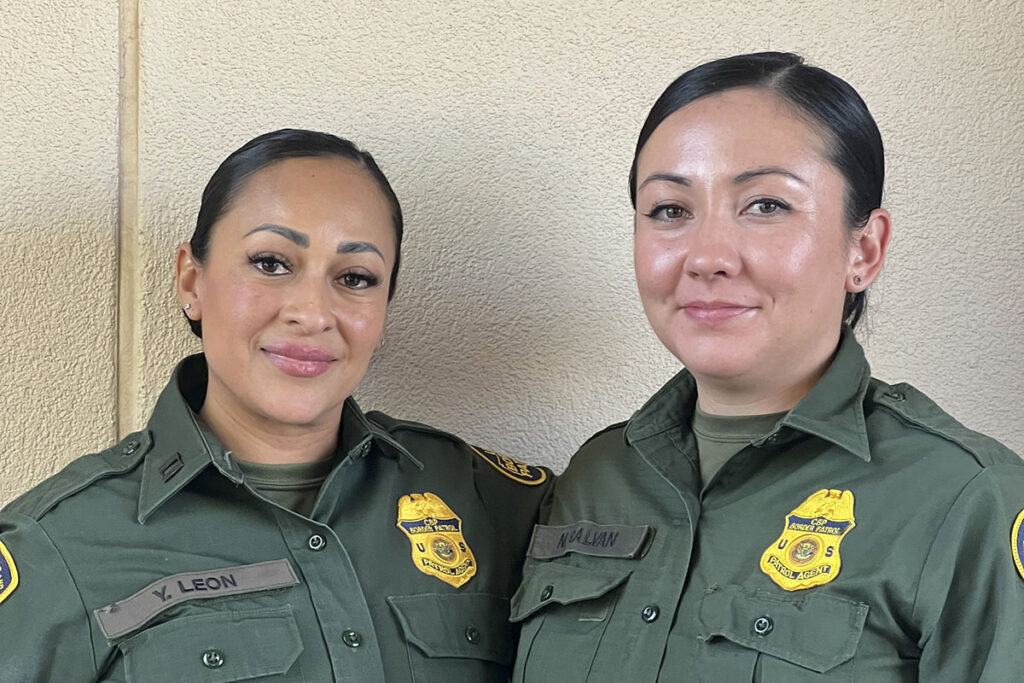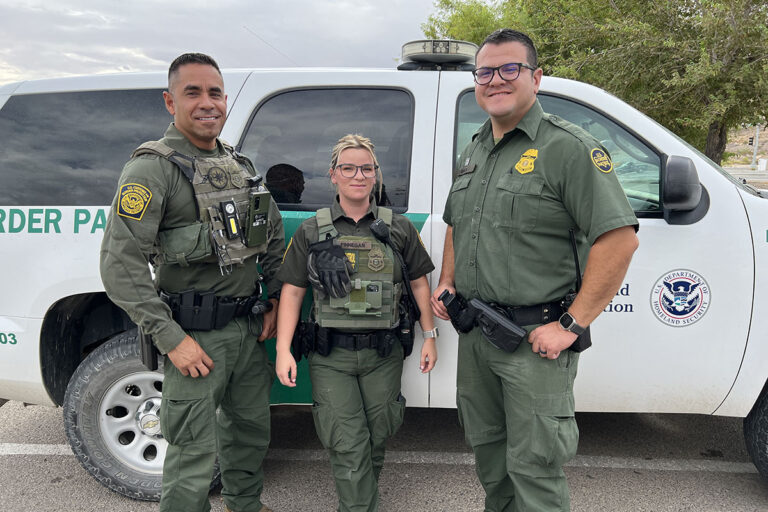
OFFICERS | Nicole Galván and Yesenia León are members of the Border Patrol. (Photos/Morgan Smith)
MARCIA, NICOLE AND YESENIA ARE AGENTS OF THE BORDER PATROL
Morgan Smith / [email protected].
Haga click aquí para leer la versión en español
8.9% of Marines are women, 17.3 % of the US Army and 20% of the US Navy.
Why, then, are the numbers so low – 5% – for the US Border Patrol (BP). My goal for this December 7 meeting with two women BP agents was to try to get some answers. Women in law enforcement is not just a Border Patrol issue, however; it’s a national one. For example, on December 5, the New York Times ran a lengthy article about the New Jersey State Patrol and how a number of recently retired women officers have brought a lawsuit in an effort to combat the discrimination they have experienced there. Only 5.6 percent of New Jersey’s troopers are women compared to 10.5 percent in neighboring New York state.
At an August 8, 2023 meeting led by Agent Fidel Baca, I met a woman BP agent named Marcia Finnegan who had joined three years ago. She was from Illinois and said that her family members and friends had tried to discourage her from joining but she did anyway and was very much enjoying her work. At the time, Baca referred to her as one of the “Fierce Five Percent” and indicated that the BP needed more women with the different experiences and perspectives they could bring.
It was Baca and Agent Claudio Herrera-Baeza who organized our December 7 meeting at the Border Patrol headquarters near Santa Teresa. I’m grateful for their continuing courtesy and assistance.
The two women agents we met with were exceptional. Nicole Galván had been an agent for five years and was stationed in Lordsburg, New Mexico 160 miles west of El Paso and near the Arizona border. That station has 80 miles of border and 4,256 square miles, more than the combined area of Delaware and Rhode Island. She comes from a law enforcement family; her father was with the El Paso Sheriff’s office. She has also been in the National Guard for ten years.

WITH EXPERIENCE| Marcia Finnegan surrounded by her fellow officers.
She works the midnight shift which sounds like it could be dangerous.
Yesenia León was born in Chihuahua, Mexico, was brought to the US when she was four, and has been an agent for fourteen years. She too had prior law enforcement and military experience, having joined the Army Reserve when she was seventeen, and subsequently having worked in a juvenile boot camp and in the Otero County prison. She studied sociology at the University of Texas at El Paso (UTEP) and says she joined because she “wanted to keep serving.” She has worked as both a chemical specialist and a canine agent.
We’ve also come to know another woman agent who is taking a medical retirement after nineteen years of service. Born in Mexico, she had been a police officer in Juárez for thirteen years before becoming a US citizen and joining the Border Patrol.
I mention this because a prior commitment to law enforcement or military work seems to be a common theme. How many women, however, have this long standing commitment to this type of law enforcement work that these have?
What did I earn from these interviews and from my prior contacts with the Border Patrol? What can be done to help recruit more women but also more men? Having observed BP agents in action in the Sunland Park, New Mexico-Anapra, Mexico area, I believe that they are essential to controlling the border – more so than building more walls – but there simply aren’t enough of them. Now President Biden is pushing hard for funds to hire more but encountering deep Republican resistance.
Here are some factors to consider.
Is the polygraph test that all applicants must take too rigorous?
There is a $10,000 signing bonus for those who complete the lengthy application and testing process but it applies to both men and women. Should there be an addition incentive for women?
Many branches of our military have developed different standards for physical tests for women, conceding that women are generally less strong. The BP doesn’t do this, believing that the grueling nature of their work requires that both men and women meet the same standard. Should this be modified and is it a disincentive for women applicants?
What about the larger question of recruiting for military and law enforcement jobs? The US Army, Air Force and Navy are all having recruiting problems, even though they offer financial incentives. For certain Army jobs, there are bonuses of up to $50,000.
I don’t have answers to these questions. All I can do at this point is express my gratitude to those agents I have met, hope that Biden’s quest for additional funding is successful and that we can find BP applicants like Nicole Galván and Yesenia León.
You may also like:
New Shelter in Denver Only Welcomes Migrants from Zuni Street Camp






otras noticias
Getting vaccinated post-COVID reduces risk and prolongs immunity
The chords of mariachi resonated at MSU-Denver
Denver launches assistance program for asylum seekers